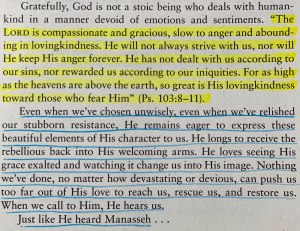Photo shows excerpt from Awaken, by Priscilla Shirer, published by B&H Publishing
You can always tell God is trying to get your attention about something when He keeps bringing it up. This very thing happened to me recently: I was reading Psalm 103 late one evening, and then Day 34 in Priscilla Shirer’s Awaken the next morning, really just a few hours later.
She was talking about Manasseh, who ranks right up there among the most despicable kings Judah ever had. He was, to put it mildly, a hopeless case, and it is safe to say he had a lot to do with Judah earning time in exile. He was exiled too, of course, and 2 Chronicles 33:11 shares that, “They put a ring through his nose, bound him in bronze chains, and led him away to Babylon.”
But then something amazing happened. Remember, this was a truly evil king: “Manasseh also murdered many innocent people until Jerusalem was filled from one end to the other with innocent blood. This was in addition to the sin that he caused the people of Judah to commit, leading them to do evil in the LORD’s sight.” (2 Kings 21:16) Even so, something happened and, while in exile, he woke up to his sin.
“But while in deep distress, Manasseh sought the LORD his God and sincerely humbled himself before the God of his ancestors.” (2 Chron. 33:12)
It took exile and being “in deep distress” for the change to occur, but it turns out Manasseh wasn’t a hopeless case after all. He humbly repented, turned his life around completely (which is what repentance is all about), and not only did God forgive him but He also returned this formerly evil king to his kingdom. Why? The answer is found in Psalm 103:8-11.
The LORD is compassionate and merciful,
slow to get angry and filled with unfailing love.
He will not constantly accuse us,
nor remain angry forever.
He does not punish us for all our sins;
he does not deal harshly with us, as we deserve.
For his unfailing love toward those who fear him
is as great as the height of the heavens above the earth.
So, on Day 34 of Awaken, Priscilla references Psalm 103:8-11. In this devotion, she covers how limitless God’s mercy is, that it’s never too late and you’re never too far gone for God to restore you – just like He did Manasseh (2 Chron. 33).
No matter what you have done, no matter how evil you have been, you are never too far gone for God to restore you if you will only humble yourself, fall on His mercy, and repent – turning your life around and your back on sin. Jesus came specifically to die for our sins: Yours won’t stand between you and Him unless you let them.
Most of my readers are Christians and hopefully already understand the magnitude of God’s grace and mercy, how willingly He gave His Son Jesus as a sacrifice for even the worst of sinners. So, it’s time to take this knowledge and carry it even further.
How many times, especially if you live in the south, have you heard it said of a horrible person, “He needs Jesus!” Usually, this is more of a culturally-based sentiment than a spiritually-based declaration, but it is true. We all need Jesus, including the most evil person you know. Further, if that evil person doesn’t receive Jesus, he or she will spend eternity in Hell.
So, I’m here to offer us a challenge. Let’s choose to genuinely walk in the love of the Lord, following Jesus’ example. I propose that we each select one person, just one, who seems unredeemable, and commit to pray for them until God tells us to stop. More to the point, ask God who He would have that one person be. You may not like His choice, but if He asks anything of you, He has a purpose.
Because prayer is unimaginably powerful. It is, truly, one of the most mind blowing weapons in our arsenal, and it can accomplish amazing things. Honestly, usually those things, those changes, are revealed first in us. For instance, as we pray for another person, often we find ourselves letting go of unforgiveness (even unforgiveness we didn’t know we were holding onto) and growing in compassion, mercy, and the love of God. This is a massive step forward for us even if we never personally see a change in the other.
But what if there is a change? What if your Manasseh repents and becomes a whole new man? What if he starts living his life differently? What if he ends up in Heaven instead of Hell? I trust that you wouldn’t really wish an eternity in Hell on even the most evil person you know. The positive changes in him could be as far reaching as Manasseh’s changes, affecting untold numbers of people for years down the road.
You would have had a part in it, and that part’s only cost is humbling yourself and praying for someone who doesn’t deserve it – any more than you deserved it when Jesus accepted you.
Celebrating Jesus!
Tammy C
Scriptures used are in the New Living Translation (NLT)


